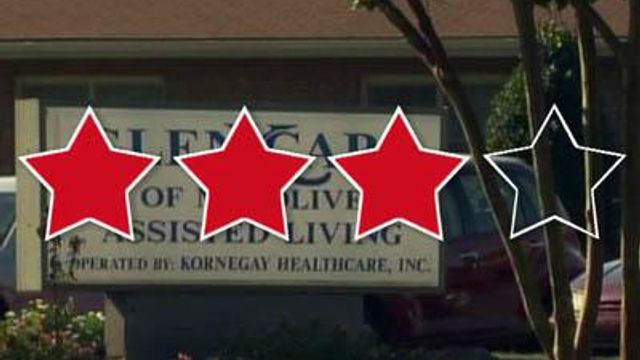Site of hepatitis outbreak still touted on state website
A Wayne County assisted living center where a hepatitis B outbreak has killed five people still is listed on a state rating website as scoring three out of a possible four stars.
Posted — UpdatedFive residents of Glen Care of Mount Olive who have died since August had hepatitis, while three other residents contracted the disease but survived, according to state officials. The deceased ranged in age from 63 to 83.
Investigators with the state Division of Public Health issued a report last week that said unsafe practices with blood-glucose monitors likely spread the illness. The monitors were sometimes stored together, weren't labeled with residents' names and were disinfected after each use, according to investigators.
Hepatitis B is a contagious virus that can cause severe liver problems, and it is typically transmitted by exposure to blood or body fluids. Symptoms include fever, extreme fatigue, loss of appetite, vomiting, dark urine and yellowish skin.
On the state Division of Health Service Regulation's star-rating website, Glen Care is shown to have scored a 102.5, which reflects a clean inspection and 2.5 bonus points for having a quality-improvement program.
Those results, however, are from a March 31 inspection. The hepatitis outbreak and a recent corrective plan issued by the Division of Health Service Regulation to ensure the safety of Glen Care's residents aren't noted anywhere on the website.
"The ratings will be updated to reflect that within the next 30 days or less," division Director Jeff Horton said Monday.
The division mailed its final report to Glen Care officials on Monday after a month-long investigation, Horton said, and state law allows 45 days after that to post updates to the website. The report, which is expected to be made public later this week, will include the fines imposed for any regulatory violations.
Horton said the division doesn't have the resources to flag Glen Care's listing on the website before the information is updated as a warning to consumers. Also, state law doesn't require such a move, he said.
Tabitha Philips, whose mother-in-law was a Glen Care resident over the summer, said the state needs to revise its star-rating system.
"As soon as they have any clue that something's going on in their facility, they need to let someone know," Philips said.
Carolyn Philips is now hospitalized with hepatitis B, and her daughter-in-law is convinced she contracted the illness at the assisted living center.
"She trusted me and my husband and her other family members to do what was best for her, and I feel like we failed," Tabitha Philips said.
She questioned how state inspectors could have missed the questionable practices involving blood-glucose monitors that public health investigators cited in their recent report.
"No way in the world they have a 102," she said of Glen Care.
Horton said inspectors make unannounced visits to assisted living centers and check them for two to three days. He said that time doesn't allow them to look at every regulatory requirement.
"We basically hit those areas we think are critical to residents' health and safety," he said. "(The inspections) are thorough and reflect the care that is being provided at that time in the facility."
Glen Care officials last week denied any responsibility for the hepatitis outbreak, suggesting it was caused by people coming in from outside or by residents sharing drinks or having sex. Medical technicians said they had never used glucose monitors on different patients.
The Division of Health Service Regulation has already issued a six-point corrective plan to Glen Care for infection control. By Friday, the facility must appoint a staff member to coordinate infection-control measures at the facility, provide staff training on proper procedures and have a registered nurse or pharmacist observe blood-glucose monitoring of patients at least once a week.
Public health officials also recommended that Glen Care store glucose meters in residents' rooms, disinfect them after each use and switch to single-use needles for the devices.
Horton said people looking for an assisted living center for themselves or relatives should visit facilities and ask to see the most current inspection report at each.
"We've never encouraged folks to use solely the rating system for choosing a care facility," he said.
• Credits
Copyright 2024 by Capitol Broadcasting Company. All rights reserved. This material may not be published, broadcast, rewritten or redistributed.





